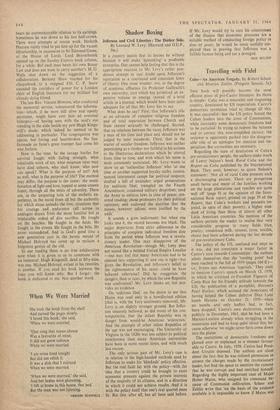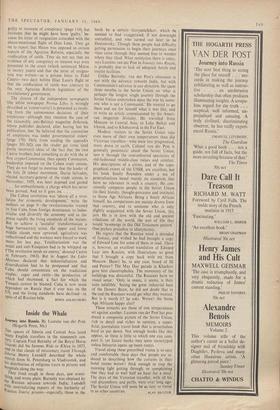Travelling with Fidel
THIS book will possibly become the most efficient piece of pro-Castro literature. Its thesis is simple: Cuba was a miserable and stagnating country, dominated by US imperialism. Castro's democratic revolution tried to change all this. It was successful—but the US policy forced the Cuban leaders into the arms of Communism, while inevitably some democratic freedoms had to be curtailed. In trying to redress the balance and to correct this over-simplified picture, the reviewer is apparently pushed into the disagree- able role of an apologist for reaction and im- perialism. But corrections are necessary.
Regarding the state of destitution of Cuba's pre-revolutionary people, the authors make much of Lawry Nelson's book Rural Cuba and the Report on Cuba published by the International Bank. They omit, however, to quote Nelson's statement: 'Not all of rural Cuba presents such a discouraging picture. There are prosperous small farms and many of the families working on the large plantations and ranches are quite well off' (page 9) or the opinion of the Inter- national Bank report, printed on page 39 of the Report, that Cuba's workers and peasants en- joyed, in spite of their poverty, a higher stan- dard of living than those of almost all other Latin American countries. No mention of the authors permits the reader to realise that very considerable progress in many fields (rice, poultry, condensed milk, cement, tyres, textiles, shoes) had been achieved during the last decade of pre-revolutionary Cuba.
The policy of the US, confused and inept as it was, did not constitute a major factor in Castro's turn towards Communism: the authors admit themselves that the 'turning point' had been reached in the fall of 1959 (pages 104 if.)- i.e., before any American 'reprisals.' They omit to mention Castro's speech on March 13, 1959, in which he criticised ex-President Figueres of Costa Rica for his friendly attitude towards the US; the publication of a pamphlet, Havana's Pearl Harbor, which accused the Americans of having helped the Cuban defector Diaz Lanz bomb Havana on October 21, 1959—when no bombs and only leaflets had, in fact, been dropped; Castro's own declaration, made publicly in December, 1961, that he had been a Marxist-Leninist already when struggling in the mountains and had to keep quiet about this, be- cause otherwise 'we might never have come down into the plains.'
The restrictions of democratic freedoms are glossed over or explained in a manner favour- able to Castro. In July, 1959, Castro- had Presi- dent Urrutia deposed. The authors are silent about the fact that he was refused permission to answer the charges made by the revolutionary leader, but find the space to mention the rumour that he was corrupt and had enriched himself. Regarding the highly important case of Major Huber Matos, who resigned his command be- cause of Communist infiltration, Scheer and Zeitlin write that 'on the basis of the evidence available it is impossible to know if Matos was guilty or innocent of conspiracy' (page 110), but insinuate that he might have been 'guilty,' be- cause his letter of resignation coincided with the above-mentioned flight of Diaz Lanz. They go on to report that Matos was opposed to certain aspects of the Agrarian Reform, especially the confiscation of cattle. They do not say that no evidence of any conspiracy or treason was even presented to the court (which, sentenced Matos to twenty years) and that the letter of resigna- tion was written—as a private letter to Fidel Castro—two days before Diaz Lanz's flight or that the confiscation of cattle was contrary to the very Agrarian Reform legislation of the revolutionary government.
The closure of the independent newspapers (the leftist newspaper Prensa Libre is wrongly described as 'conservative') is presented as result- ing from the autonomous decisions of their employees—although they mention the case of the (staunchly anti-Batista) magazine Bohemia, whose publisher declared, after having lost his publication, that 'he believed that the committee of employees was under governmental orders' (page 176). Only from reading the appendix (pages 301-302) can the reader get some (and partly incorrect) ideas of the fact that the two Castro brothers had something to do with the at first crypto-Communist, then openly Communist, leadership imposed on the Cuban trade unions. They do not forget to mention that the leader of the July 26 labour movement, David Salvador, elected secretary-general of the trade unions in November, 1959, was later deposed and gaoled . . . for embezzlement, a charge which has never been proved. And so it goes on. . . .
The Cuban revolution was 'above all a revo- lution for economic development,' write the authors on page 9—the revolutionaries wanted to free Cuba from foreign dominance, to indus- trialise and diversify the economy and to im- prove rapidly the living standards of the masses. But to achieve a 'socialist' transformation a huge bureaucracy arose, the upper and lower middle classes were uprooted, agriculture was collectivised and the workers were forced to work more for less pay. Totalitarianism was the result and anti-Yanquism had to be whipped up (`The revolution needs an enemy,' shouted Castro in February, 1963). But in August the Lider Maximo declared that industrialisation and diversification had to be postponed and that Cuba should concentrate on the traditional staples: sugar and cattle—the production of Which had decreased, a fact for which the Yanquis cannot be blamed. Cuba is now more dependent on Russia than it ever was on the US, and the living standards have declined—in







































 Previous page
Previous page